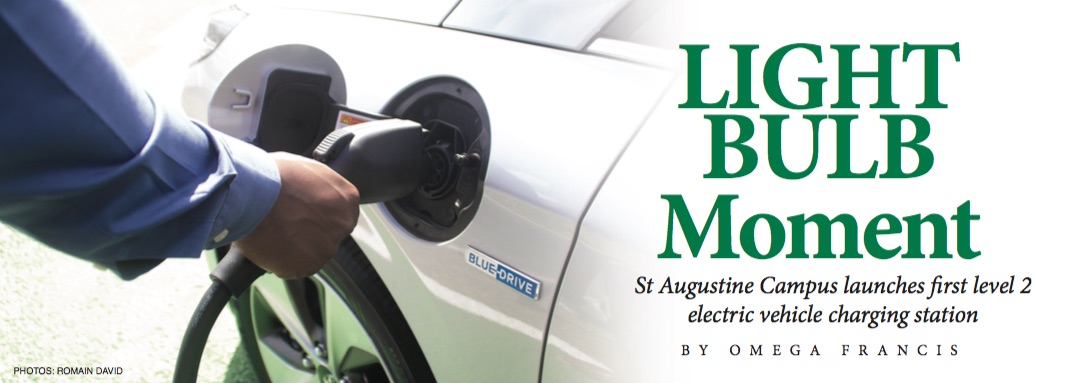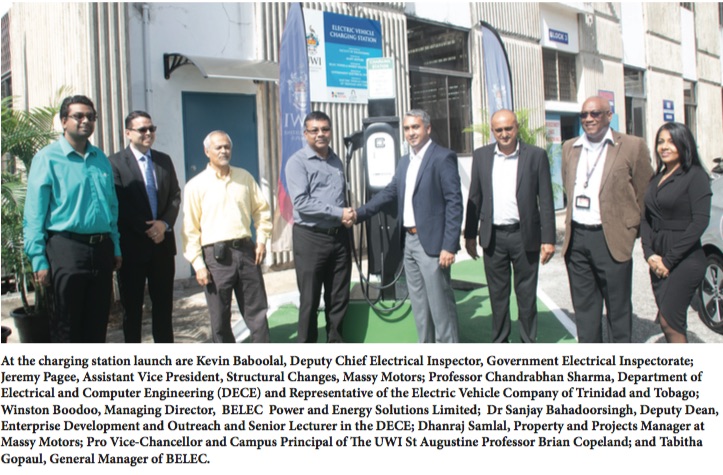
“It’s time to be part of the transportation revolution,” says Dr Sanjay Bahadoorsingh, Senior Lecturer in the Department of Electrical and Computer Engineering (DECE), and Deputy Dean of Enterprise Development and Outreach for the Faculty of Engineering. Well, the transport revolution is finally here at the UWI St Augustine Campus. On Tuesday, December 10, 2019, the campus launched the first Level 2 (230 V) Electric Vehicle Supply Equipment (EVSE) charging station, inspected by the Government Electrical Inspectorate (GEI) at the Faculty of Engineering.
This project was a result of a collaborative effort between several stakeholders: The Faculty of Engineering; Massy Motors; BELEC Power and Energy Solutions Limited; the Government Electrical Inspectorate (GEI) in the Ministry of Public Utilities, and the Electric Vehicle Company of Trinidad and Tobago (EVCOTT).
However, this was not a project that began on a whim. It evolved from years of research by Dr Bahadoorsingh and many others at DECE and the Department of Mechanical and Manufacturing Engineering who saw the need to be prepared for the transition towards electric vehicles (EVs).
Internationally, there has been a transition from internal combustion engines (ICEs) towards EVs on a large scale. Norway is currently leading with the largest per capita fleet of electric vehicles in the world. China is also ahead with the largest electric bus deployment in the world. This adoption is not surprising as many car manufacturers (such as the Volkswagen Group and Daimler) have pledged to no longer be producing ICEs by 2025 as part of a projection towards a carbon-neutral world by 2050.
Transportation accounts for about 15 per cent of all greenhouse gas emissions globally. While Trinidad and Tobago’s emissions account for significantly less than 1 per cent of this, our country is at risk from many of the adverse effects of climate change (coastal erosion, powerful and more frequent hurricanes, and tropical storms are already evident). Making strides towards low carbon emissions is something that we have dedicated ourselves towards after signing on to the Paris Agreement on climate change to reduce greenhouse emissions in 2016 (ratified locally in 2018).
Earlier this year, the International Association of Universities (IAU) selected The UWI as its global leader in the mobilisation of research and advocacy for the achievement of a climate-smart world, and the St Augustine Campus is the E-mobility hub for the Caribbean Centre for Renewable Energy and Energy Efficiency.

At The UWI, the Faculty of Engineering began its journey towards their own investment into the global transition towards EVs in 2016, with an alignment between the Faculty, the GEI and T&TEC towards a public advisory with regards to the installation of charging infrastructure.
“We decided to tackle it from the perspective of what would ensure safe adoption and also allow the technology to be embraced and grow,” Dr Bahadoorsingh says about the project.
International best practices were investigated and considered; as safety in the adoption of this technology was paramount to the local application. The intention is to have a model that others can follow; to demonstrate how it can be done safely.
The EVSE will also allow the Engineering departments to participate in data collection and research towards improvement in the infrastructure, as well as to mitigate any potential challenges in Small Island Developing States. The launch of the EVSE has also been a fantastic opportunity to push the Faculty forward towards the creation of a green space (an area adjacent to the charging station has already been earmarked for rejuvenation and transformation). The future of this space will include sustainable power from renewable energy sources including solar photovoltaics and wind turbines to make this project and others carbon free. (At this time the charging station is electric grid powered).
A look towards the future can see Trinidad and Tobago converting ICEs to EVs, as well as storage from renewable energy to ensure we are no longer heavily dependent on fossil fuels, in an effort to reduce our carbon footprint and improve our environmental consciousness with health benefits. Gone would be the days of needing to line up at a gas station as our cars would be powered from our homes, and in turn, power our homes when required. The transition towards EVs offers endless possibilities, and adoption of these locally would be an absolute game changer.
Currently, the EVSE Level 2 Charging Station is open to the campus community. It is located at the parking spot bordering the Faculty of Engineering Building on the southern side of campus, close to the southern gate.